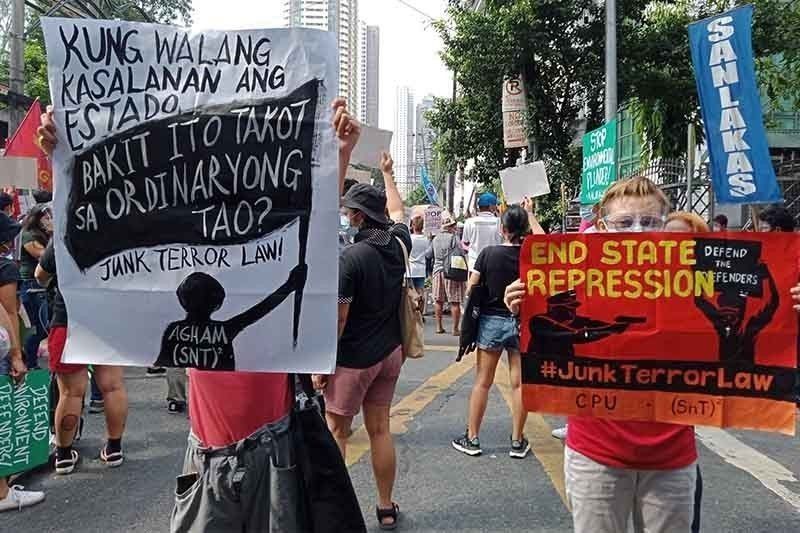Chief justice Gesmundo: Ruling on anti-terrorism law 'hopefully' before year end

MANILA, Philippines — The Supreme Court will do “its best” to come out with a decision on the 37 petitions challenging the Anti-Terrorism Act of 2020 before the year ends, Chief Justice Alexander Gesmundo said.
In a chance interview on Friday, the chief justice noted that the tribunal only received the memoranda, filed by the clusterings earlier agreed upon, from the petitioners last week.
“But by the sheer number of petitions it might take some time before the Court can at least prepare its draft but hopefully within the year perhaps we can have a decision on that 37 petitions before the year ends,” he said.
“We’ll do our best to have that petitions decided before [Associate Justice Rosmari Carandang] retires,” Gesmundo also said.
During the oral arguments, Carandang was the first among the justices to interpellate the oralists. Traditionally, the member-in-charge of the case goes first in questioning parties.
She is set to retire in January 2022.
Following the rules of court, unresolved petitions of a retiring justice will be passed on to the magistrate who will fill up the vacancy.
EXPLAINER: Cheat sheet: Key issues raised at SC oral arguments on anti-terrorism law
Petitioners to SC: Now is 'such time' for court to act
It has been more than a year since President Rodrigo Duterte signed the anti-terrorism law. The first petition challenging the law was filed less than 24 hours after the Palace announced its signing.
Petitioners have been appealing to the SC to temporarily halt the implementation of the law, but no halt order has been issued since.
In a memorandum drafted by rights lawyer Evalyn Ursua, petitioners listed various appeals to the SC to issue a temporary restraining order, status quo ante order and/or injunctive relief—all pleadings cite “escalating incidence of red-tagging and terrorist designation of critics and activists,” many of whom are petitioners and legal counsels of the case themselves.
“Despite these developments with serious and adverse impact on petitioners, the Honorable Court has yet to act on the prayer for injunctive relief,” they told the court.
Petitioners led by retired Justices Antonio Carpio and Conchita Carpio-Morales, in their separate memorandum, said this is “such a time” for the SC to exercise its function “when the prohibitions of the Bill of Rights must be vigorously enforced.”
“Petitioners invoke the judicial power because the ATA hangs ominously over their heads like the Sword of Damocles and prevents them from exercising their constitutional rights. They pray that they be heard before tragic consequences befall them,” they added.
- Latest
- Trending




























